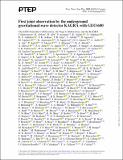First joint observation by the underground gravitational-wave detector KAGRA with GEO 600
Author(s)
Sudhir, Vivishek
DownloadPublished version (18.41Mb)
Publisher with Creative Commons License
Publisher with Creative Commons License
Creative Commons Attribution
Terms of use
Metadata
Show full item recordAbstract
We report the results of the first joint observation of the KAGRA detector with GEO 600. KAGRA is a cryogenic and underground gravitational-wave detector consisting of a laser interferometer with 3 km arms, located in Kamioka, Gifu, Japan. GEO 600 is a British–German laser interferometer with 600 m arms, located near Hannover, Germany. GEO 600 and KAGRA performed a joint observing run from April 7 to 20, 2020. We present the results of the joint analysis of the GEO–KAGRA data for transient gravitational-wave signals, including the coalescence of neutron-star binaries and generic unmodeled transients. We also perform dedicated searches for binary coalescence signals and generic transients associated with gamma-ray burst events observed during the joint run. No gravitational-wave events were identified. We evaluate the minimum detectable amplitude for various types of transient signals and the spacetime volume for which the network is sensitive to binary neutron-star coalescences. We also place lower limits on the distances to the gamma-ray bursts analyzed based on the non-detection of an associated gravitational-wave signal for several signal models, including binary coalescences. These analyses demonstrate the feasibility and utility of KAGRA as a member of the global gravitational-wave detector network.
Date issued
2022-04-30Department
LIGO (Observatory : Massachusetts Institute of Technology)Journal
Progress of Theoretical and Experimental Physics
Publisher
Oxford University Press
Citation
The LIGO Scientific Collaboration, The Virgo Collaboration, The KAGRA Collaboration Progress of Theoretical and Experimental Physics, Volume 2022, Issue 6, June 2022, 063F01.
Version: Final published version
ISSN
2050-3911